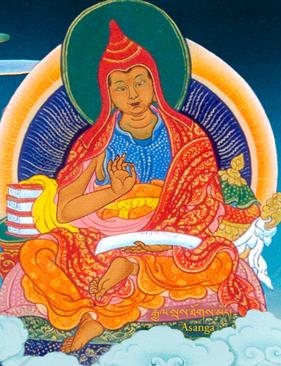Chittamatra: Difference between revisions
Jump to navigation
Jump to search
mNo edit summary |
|||
| (16 intermediate revisions by 4 users not shown) | |||
| Line 1: | Line 1: | ||
[[Image:Asanga.JPG|frame| | [[Image:Asanga.JPG|frame|[[Asanga]]]] | ||
The '''Chittamatra''' (Skt. ''Cittamātra''; Tib. '' | The '''Chittamatra''' (Skt. ''Cittamātra''; Tib. [[སེམས་ཙམ་པ་]], ''Semtsampa'', [[Wyl.]] ''sems tsam pa'') or 'Mind Only' School is a [[Mahayana]] school founded by [[Asanga]] in the 4th century AD. Its followers say that all phenomena are merely mind (Skt. ''vijñaptimātra'')—the [[all-ground consciousness]] manifesting as environment, objects and the physical body, as a result of habitual tendencies stored within the all-ground. | ||
=== | This school is also known under the names of '''[[Yogachara]]''', '''Vijñānavāda''' and '''Vijñānaptimātra'''. | ||
==Canonical Literature== | |||
===Sutras=== | |||
*[[Avatamsaka Sutra]] | |||
*[[Lankavatara Sutra]] | |||
*[[Samadhiraja Sutra]] | |||
*[[Samdhinirmochana Sutra]] | |||
===Shastras=== | |||
*[[Thirty Stanzas]] | |||
*[[Treatise on the Three Natures]] | |||
*[[Twenty Stanzas]] | |||
===The | ==Tenets== | ||
===The Three Natures=== | |||
They divide all phenomena into the ‘[[three natures]]’: | |||
*the [[imputed nature|imputed]] or 'imaginary', | |||
*the [[dependent nature|dependent]], and | |||
*the [[truly existent nature|truly established]]. | |||
===The Chittamatra View of the [[two truths|Two Truths]]=== | |||
[[Khenpo Ngakchung]] says: | [[Khenpo Ngakchung]] says: | ||
:All the dualistic phenomena of the imputed nature and the mind and mental phenomena of the dependent nature are the deceiving phenomena of delusion, the '''[[relative truth]]'''. The essence of the dependent nature, which is the naturally luminous consciousness, and the fully established nature, which is the fact that this [i.e., the dependent nature] is empty of the dualistic projections of the imputed nature—comprising the nature of reality and wisdom—are said to be the '''[[absolute truth]]'''. | :All the dualistic phenomena of the imputed nature and the mind and mental phenomena of the dependent nature are the deceiving phenomena of delusion, the '''[[relative truth]]'''. The essence of the dependent nature, which is the naturally luminous consciousness, and the fully established nature, which is the fact that this [i.e., the dependent nature] is empty of the dualistic projections of the imputed nature—comprising the nature of reality and wisdom—are said to be the '''[[absolute truth]]'''. | ||
==Subschools== | |||
There are two subschools of Mind Only: | There are two subschools of Mind Only: | ||
#[[True Aspectarians]] and | |||
#[[False Aspectarians]]. | |||
==Alternative Translations== | |||
*Mere Mentalist (Brunnholz) | |||
[[Category:Key Terms]] | [[Category:Key Terms]] | ||
[[Category:Chittamatra| ]] | |||
[[Category:Schools and Lineages]] | [[Category:Schools and Lineages]] | ||
[[Category:Philosophical Tenets]] | [[Category:Philosophical Tenets]] | ||
[[Category: | [[Category:Mahayana]] | ||
[[Category:Sanskrit Terms]] | |||
Latest revision as of 08:26, 14 September 2023

The Chittamatra (Skt. Cittamātra; Tib. སེམས་ཙམ་པ་, Semtsampa, Wyl. sems tsam pa) or 'Mind Only' School is a Mahayana school founded by Asanga in the 4th century AD. Its followers say that all phenomena are merely mind (Skt. vijñaptimātra)—the all-ground consciousness manifesting as environment, objects and the physical body, as a result of habitual tendencies stored within the all-ground.
This school is also known under the names of Yogachara, Vijñānavāda and Vijñānaptimātra.
Canonical Literature
Sutras
Shastras
Tenets
The Three Natures
They divide all phenomena into the ‘three natures’:
- the imputed or 'imaginary',
- the dependent, and
- the truly established.
The Chittamatra View of the Two Truths
Khenpo Ngakchung says:
- All the dualistic phenomena of the imputed nature and the mind and mental phenomena of the dependent nature are the deceiving phenomena of delusion, the relative truth. The essence of the dependent nature, which is the naturally luminous consciousness, and the fully established nature, which is the fact that this [i.e., the dependent nature] is empty of the dualistic projections of the imputed nature—comprising the nature of reality and wisdom—are said to be the absolute truth.
Subschools
There are two subschools of Mind Only:
Alternative Translations
- Mere Mentalist (Brunnholz)